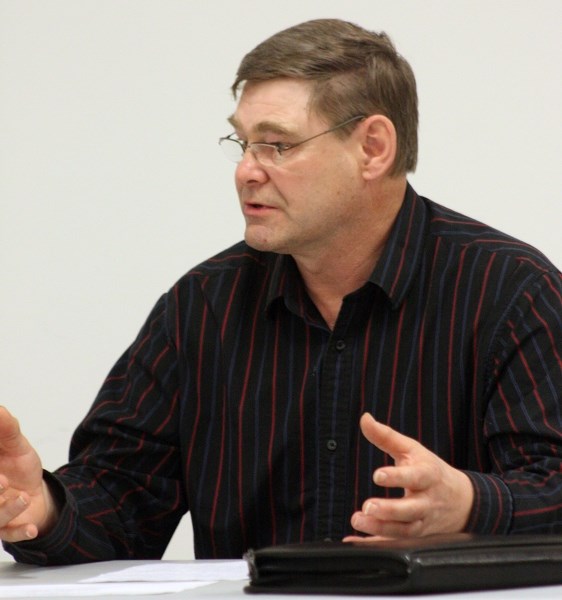The response to comments made by a local public school trustee, who suggested gay students should “act less gay” if they don’t want to be bullied, has been far-reaching.
Major news sources across the country have reported on Pembina Hills school division trustee Dale Schaffrick’s comments, which were made at the fall convention of the Alberta School Boards Association on Nov. 19 in Edmonton, and his subsequent apology.
He reiterated that apology for the Westlock News Thursday.
“I would like to let you know that I truly apologize for the remarks that I made at the ASBA fall general meeting. They were inappropriate, and offensive, and I apologize for that,” he said, adding he “absolutely” believes that gay students need protection from discrimination.
He also specified that he made the comments as an individual trustee, and they in no way reflect the feeling of the board as a whole.
“I was speaking as an individual, and my colleagues had no idea what I was going to say when I went to the mike,” he said. “They have nothing to do with what I said or didn’t say.”
Pembina Hills board chair Sharon Volorney condemned the comments, emphasizing they do not reflect the board’s view on this matter.
“His remarks were very unacceptable and inappropriate,” Volorney said on Friday.
The comments were made during a debate about implementing a policy that would specifically single out gay students for protection from discrimination and bullying, which was ultimately voted down.
Volorney said while the Pembina Hills board believes in protecting all students from discrimination, trustees did not feel it would be a good idea to single out any particular group for protection.
“The policy that was under discussion at the ASBA, we voted against that because we believe that the best approach to any kind of bullying is a global approach,” Volorney said. “Bullying is unacceptable for everyone; all students and staff must be safe in our schools.”
Schaffrick said that is his own personal view as well, but his comments at the meeting were “not worded well.”
“I believe that every child in our schools needs our support to try to prevent bullying, and I did not want to stray from that,” he said.
Public reaction has been predominantly negative, particularly in social media. Even education minister Jeff Johnson condemned the comments on Twitter.
“Education Act is clear All kids deserve a safe welcoming place to go to school no matter what they wear or how visible they are,” he wrote in one tweet, following it up with, “As a parent I would never ask my child to hide who they are.”
Heidi Magus, director of the Hope Resource Centre in Westlock, said her organization addresses not just domestic violence but bullying as well — a problem the remains somewhat prevalent in our community and can have a serious impact.
Without offering specifics of the cases, she said between six and 10 clients a year come to the centre with concerns about bullying, with some reporting significant negative effects in their lives.
“Obviously there is some psychological damage that is being done,” she said.
“They’re going right for their inner being; they’re not just saying their hair is ugly for the day and they can just brush that off.”
The risk associated with bullying, even if it’s just verbal, goes beyond psychological and emotional damage. Magus said she knows of some reports of self-cutting that result from bullying.
She emphasized that the way forward is with more education for parents, students and teachers alike, as well as continued discussion about the effects of bullying and the way to reduce it — regardless of the reason for the bullying.
As for suggesting victims try to hide the personality trait for which they’re being bullied, Magus said that in itself could be construed as a form of bullying.
“There are things you can do to protect yourself from being bullied, but to pretend you’re something that you’re not, then in a way that’s a form of bullying — someone else is trying to control you,” she said.
Regardless, progress continues to be made to address bullying in schools and the community as a whole, and Magus said as long as we remain vigilant and continue to talk about bullying, we can continue to make progress.
“We’ve got to keep that communication going, and as long as that’s in the forefront – stopping the bullying – then I think more people would react,” she said. “As soon as we stop doing those actions, and those activities, it’s just going to continue.”



